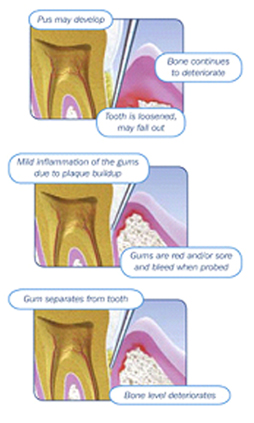Almost three quarters of the population have some form of gum disease, but are unaware of it. Gum disease is the inflammation and infection of the gums and the surrounding tissue. Generally caused by bacterial plaque, it is the most significant cause of adult tooth loss.
Plaque – a thin, colorless film – is caused by bacteria in your mouth and it grows on your teeth. Left untreated, bacterial plaque will harden to yellow/brown tartar. Tartar excretes the toxins that cause gum inflammation, which can lead to the loosening of the teeth, or even make teeth fall out; as the condition worsens, the accumulated toxins and bacteria move deeper into the jaw to destroy the bone that holds your teeth in place.
- Red, inflamed gums
- Bleeding while brushing or flossing
- Receding gums
- Loose or separating teeth
- Presence of pus between the gum and tooth
- Chronic halitosis (bad breath)
Gum disease can certainly do a lot of damage to your mouth, but it can also lead to other health problems. Research has linked gum disease to problems such as heart disease, osteoporosis, stroke, and complications with diabetes. In pregnant women, gum disease is linked to significant over growth of gums, premature labour, and low birth weight of infants. Due to the initially mild symptoms, many people don't realize they have gum disease, which can allow the condition to worsen. You may have an increased risk for gum disease if you smoke, have diabetes, take certain medications, endure excessive stress, or eat poorly.
If caught in the early stages, your dentist can reverse gum disease. To begin, the dentist will scale the teeth to remove plaque, and plane the roots to smooth them. The doctor may also prescribe antibiotics to clear up any infection or inflammation. Advanced cases may require your dentist to surgically trim the gums, disinfect the tissue, remove the hardened plaque build-up, and re-contour the damaged bone. At South Star Family Dental, we use a dental laser to treat gum disease with high success rates.
FAQs
My gums bleed when I brush. Should I be worried?
If you had bleeding on your arm or leg, you would check it out. Because bleeding gums can indicate a more serious problem like gum disease, you should make an appointment with your dentist to assess your condition.
Is gum disease hereditary?
Although there is a genetic component to gum disease, other factors, like lifestyle choices, age, and oral health habits, can also influence whether you develop this condition. Talk with your dentist to find out if you have other risk factors for gum disease.
What can I do to prevent gum disease?
The best prevention is taking proper care of your teeth and gums. Good brushing habits, regular flossing, and routine dental visits will go a long way to avoiding periodontal disease.
Proper treatment and good home care can stop the progression of the disease and restore your oral health. Furthermore, dental lasers can be utilized in conjunction with routine cleaning appointments to destroy disease causing bacteria in your gums.


